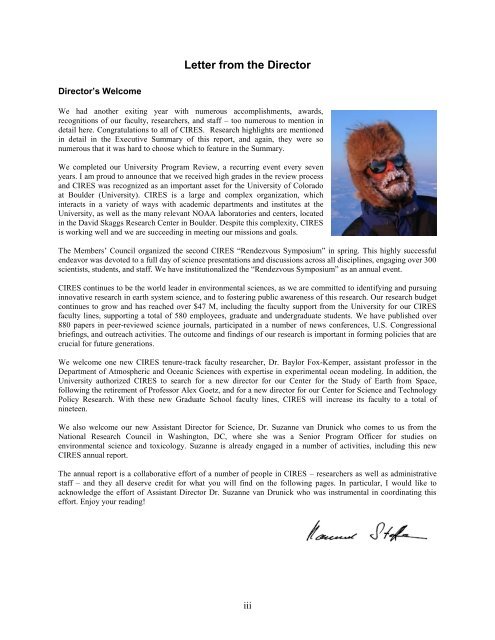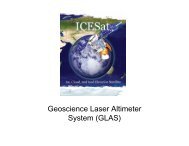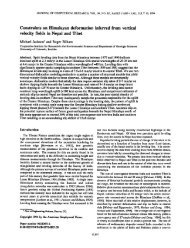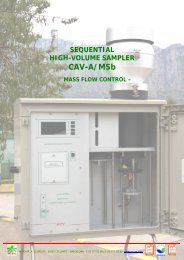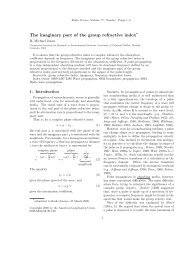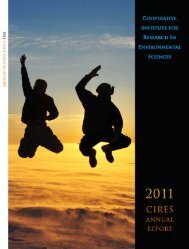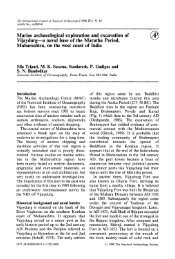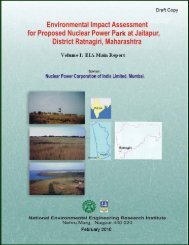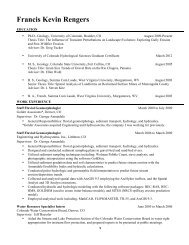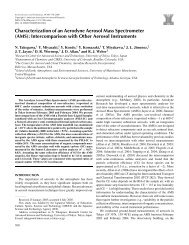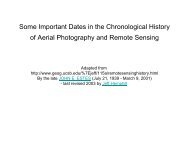Scientific Theme: Advanced Modeling and Observing Systems
Scientific Theme: Advanced Modeling and Observing Systems
Scientific Theme: Advanced Modeling and Observing Systems
Create successful ePaper yourself
Turn your PDF publications into a flip-book with our unique Google optimized e-Paper software.
Director’s Welcome<br />
Letter from the Director<br />
We had another exiting year with numerous accomplishments, awards,<br />
recognitions of our faculty, researchers, <strong>and</strong> staff – too numerous to mention in<br />
detail here. Congratulations to all of CIRES. Research highlights are mentioned<br />
in detail in the Executive Summary of this report, <strong>and</strong> again, they were so<br />
numerous that it was hard to choose which to feature in the Summary.<br />
We completed our University Program Review, a recurring event every seven<br />
years. I am proud to announce that we received high grades in the review process<br />
<strong>and</strong> CIRES was recognized as an important asset for the University of Colorado<br />
at Boulder (University). CIRES is a large <strong>and</strong> complex organization, which<br />
interacts in a variety of ways with academic departments <strong>and</strong> institutes at the<br />
University, as well as the many relevant NOAA laboratories <strong>and</strong> centers, located<br />
in the David Skaggs Research Center in Boulder. Despite this complexity, CIRES<br />
is working well <strong>and</strong> we are succeeding in meeting our missions <strong>and</strong> goals.<br />
The Members‘ Council organized the second CIRES ―Rendezvous Symposium‖ in spring. This highly successful<br />
endeavor was devoted to a full day of science presentations <strong>and</strong> discussions across all disciplines, engaging over 300<br />
scientists, students, <strong>and</strong> staff. We have institutionalized the ―Rendezvous Symposium‖ as an annual event.<br />
CIRES continues to be the world leader in environmental sciences, as we are committed to identifying <strong>and</strong> pursuing<br />
innovative research in earth system science, <strong>and</strong> to fostering public awareness of this research. Our research budget<br />
continues to grow <strong>and</strong> has reached over $47 M, including the faculty support from the University for our CIRES<br />
faculty lines, supporting a total of 580 employees, graduate <strong>and</strong> undergraduate students. We have published over<br />
880 papers in peer-reviewed science journals, participated in a number of news conferences, U.S. Congressional<br />
briefings, <strong>and</strong> outreach activities. The outcome <strong>and</strong> findings of our research is important in forming policies that are<br />
crucial for future generations.<br />
We welcome one new CIRES tenure-track faculty researcher, Dr. Baylor Fox-Kemper, assistant professor in the<br />
Department of Atmospheric <strong>and</strong> Oceanic Sciences with expertise in experimental ocean modeling. In addition, the<br />
University authorized CIRES to search for a new director for our Center for the Study of Earth from Space,<br />
following the retirement of Professor Alex Goetz, <strong>and</strong> for a new director for our Center for Science <strong>and</strong> Technology<br />
Policy Research. With these new Graduate School faculty lines, CIRES will increase its faculty to a total of<br />
nineteen.<br />
We also welcome our new Assistant Director for Science, Dr. Suzanne van Drunick who comes to us from the<br />
National Research Council in Washington, DC, where she was a Senior Program Officer for studies on<br />
environmental science <strong>and</strong> toxicology. Suzanne is already engaged in a number of activities, including this new<br />
CIRES annual report.<br />
The annual report is a collaborative effort of a number of people in CIRES – researchers as well as administrative<br />
staff – <strong>and</strong> they all deserve credit for what you will find on the following pages. In particular, I would like to<br />
acknowledge the effort of Assistant Director Dr. Suzanne van Drunick who was instrumental in coordinating this<br />
effort. Enjoy your reading!<br />
iii


